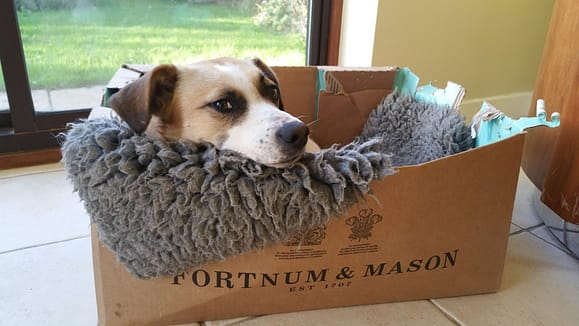Clutter and packaging – Don’t buy it in the first place. Less clutter and less packaging means less to recycle and less in landfill.
Rubbish Day
It’s rubbish day. But we haven’t got that much to put out. There isn’t enough to fill a black plastic bag.
Some time ago I bought a kitchen bin that is divided into two sections. The larger section we use for recycling. The smaller section is for rubbish. This week there was hardly anything in it; there is one transparent blue plastic bin liner and it seems a shame to put that into a black refuse bag.
I decide to put the rubbish out next week.
Reduce packaging and waste
This got me thinking. How can we reduce the packaging and waste so that there is nothing to put out at all, thus saving a job? The answer is obvious. Clutter and packaging – Don’t buy it in the first place.
Who actually likes putting the rubbish out? I don’t. I hate dragging the recycling bin up our rather steep drive after 6 pm on a winter’s evening; we are not supposed to put it out before 6 pm. The green bin can be very heavy when full.
Even worse is the realisation, on rubbish day, that I have forgotten to put the rubbish out. I throw on my clothes and Wellington boots and run up the drive in order to beat the disposal lorries.
But if we cut back on the clutter and packaging that comes into the house in the first place then we cut back on the waste that goes out of it.
Buy from a local farm
One of the benefits of buying vegetables from a local farm is that they supply paper bags or you can take your own basket. I buy vegetables from the Prospects Trust in Reach, who provide paper bags.
Buying from a supermarket
Buy your vegetables loose and put them in the lightweight biodegradable bags. Avoid the black and brown plastic containers as these are not yet recycleable.
One of the advantages of buying vegetables loose rather than prepackaged is that you buy only what you need and less is wasted.
I asked one of the cashiers at the supermarket why they don’t supply paper bags. It seems paper bags are actually more expensive than plastic bags.
I also asked why they are still selling vegetables in brown plastic containers and the same cashier said that their suppliers are changing the way they package produce but that they had packaging in stock and that needs to be used up.
Buying from Zero waste supermarkets
Zero waste supermarkets allow you to refill your own containers. If you put the empty container into your shopping bag you will know exactly what you need to refill when you go shopping. Just pick up your shopping bag, replete with containers, and go.
Don’t just think about foodstuffs, think about things we buy for the bathroom – shampoo, shower gel and soap. Go for a bar of soap or shampoo. Avoid anything that comes in a plastic bottle if you can.
It seems somewhat contradictory buying non-toxic skin care packaged in plastic bottles, some of which are non recyclable.
When buying anything consider how much effort is involved in disposing of the item and its packaging when you are finished with it. Think of the effort you put into recycling, deciding which bin somethings goes in, and pulling the bin up the drive on rubbish day. Then think of the effort the recycling company has to put in, sorting, processing and selling the waste or otherwise disposing of it.
Suppliers and packaging
Suppliers, when they design packaging, are chiefly concerned with how to get you to choose their product over that of its competitors. Their second concern is the cost of that packaging. Lastly they might consider ethical concerns.
Suppliers and manufacturers are not currently picking up the cost of recycling. The consumers and taxpayers are picking up this cost.
If the manufacturer were expected to deal with the waste products I expect packaging would look very different.
If the cost of disposing of an item were costed into the purchase price at the outset would we, the consumer, still buy it?
The government has set out how it plans to move towards a circular economy in Resources and Waste Strategy.
Online shopping
Many people shop online these days and suppliers send out their purchases in cardboard boxes. These cardboard boxes are often plain and offer less opportunities for marketing. But when the packaging does come into the house, look for an alternative use for it.

